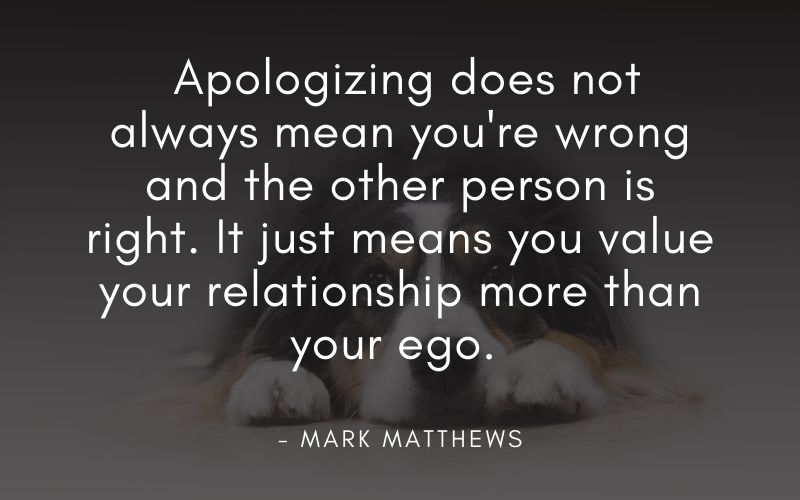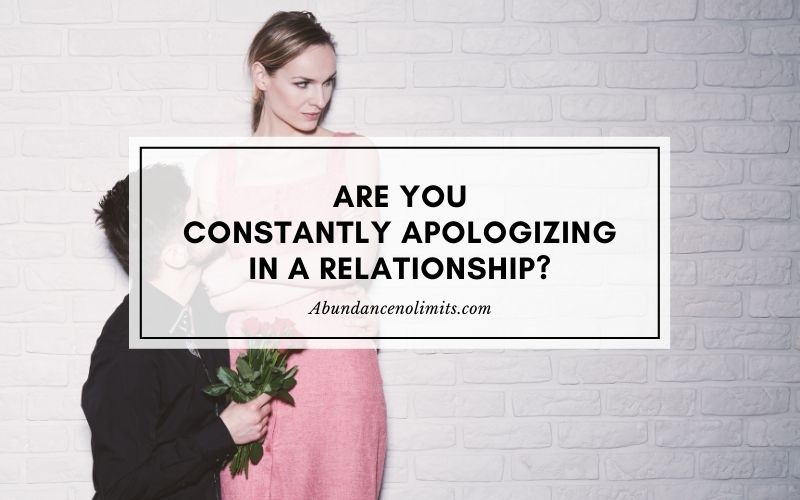Are you constantly apologizing in a relationship? Are you aware of how often you say “I’m sorry” in a day? Do you apologize when you did nothing wrong?
Someone bumps into you and you say sorry. Food delivery is getting delayed and you say sorry. A live telecast of an important match gets disrupted and you say sorry. In fact, anything goes wrong around you for no fault of yours but you still say sorry.
Are you aware that your tendency to constantly apologize is turning your relationship toxic? Your partner may start taking advantage of your behavior to intimidate you and/or make you feel that you are the guilty one.
This article takes a look at the reason behind these constant apologies and how to stop saying sorry too much.
Common attributes that lead to over-apologizing
It is ingrained in our psyche from an early age to say the golden words of sorry, thank you, and excuse me. It is considered the golden standard in good behavior. Some people just don’t understand the appropriate circumstances that demand its usage or overuse it thinking it makes them a better person.
In addition to this, people with certain behavior patterns are found to be saying sorry too often or in inappropriate situations.
Empathy: When you can feel the anger and frustration felt by another person, to make it better for the person, you apologize though you did nothing wrong or did not even have anything to do with it.
Maintaining affability: You prefer a friendly and peaceful atmosphere and are not a big fan of conflicts and fights. In your effort to maintain the ambiance calm and amicable, you say sorry to diffuse the situation.
Lack of confidence: You are unsure whether you are at fault or not. The absence of self-belief and self-worth makes you doubt yourself. Whenever the other person is accusing you of wrongdoing, you willingly accept the charge and apologize profusely even if you are right.
Submissive behavior: Some people consider themselves less worthy than others and willingly submit to another person’s will. They feel that it is not right of them to have their own needs and personal boundaries.
Anxiety: If you are in constant fear of something going wrong with your relationship, you will be willing to do anything to avert a breakup. Saying sorry is part of this.
Overdscipline: If you were raised in a strict environment, either by domineering parents or authoritarian schools or both, you may have acquired the tendency to say sorry early on. This will continue into your adulthood as well.

Why do you apologize too much?
Have you ever thought “why do I apologize too much”?
Some of the underlying reasons for being over-apologetic can be attributed to the basic personal character as detailed above. However, this cannot explain it completely.
Social conditioning may be behind this urge to say sorry constantly. This can be the reason for the behavioral patterns as well.
Saying sorry, thank you, and please is taught to us as good behavior from an early age. This sticks with us at least at a subconscious level as we grow older. This habit becomes so well-entrenched in our minds that apologizing comes automatically to many of us. Often this is something we say without feeling it and not meant in the real sense.
As we consider saying sorry for good behavior, we tend to trust and comply with the requests of those who apologize before asking for our help. For example, “I’m sorry to disturb you. Can you get me a cup of coffee?”.
This means people use the act of apologizing to create a friendly atmosphere to get things done.
How does over-apologizing affect your relationship?
Constantly apologizing in a relationship is more common as an act of appeasement, to avoid confrontation or awkward situations, and to maintain the relationship on good terms. Some even think that it is a necessary component of a good relationship.
At times, one partner feels the need to say sorry to stop the other from getting angry. Or even to mask one’s own anger.
Apologizing too much can adversely affect a relationship, whether it is an automatic reaction to the situation or said to avoid conflicts. It is easy to take advantage of those who are used to apologizing too often.
When you say sorry too often and mean it, it means you are not in touch with the real feelings or trying to suppress them. This is not good for your mental health. In addition to this, you are allowing your partner to take advantage of you.
When you apologize often without meaning it, you are misleading your partner into believing that the fault is yours and not theirs. Your apology may diffuse the present crisis but it is definitely not good for a healthy relationship.
Ways to stop saying sorry too much in a relationship
1. Think before you say it
Putting a full stop to a habit you have been having for some time is daunting. Instead, as a first step, condition your mind to pause, take a breather, and think whether the situation warrants an apology before saying it.
You can ask yourself the question – “Have I done something wrong?”. If the answer comes back as no, don’t say that you are sorry. If this is not good enough to control your urge to apologize, ask yourself why you want to give others the impression that you have done something wrong.
Since you apologize as a part of good behavior, giving others a bad impression of yourself would be worse. This would certainly get you thinking and would help in getting a grip on that tendency to say sorry.
2. Understand the triggers
Sit down and understand why you feel the need to apologize. Go over some instances in the past when you have apologized for no fault of yours. Playback the scenes and find out what prompted you to say sorry.
If you check out a few instances in your past, you will find a definite pattern. You will be able to pinpoint the trigger that compels you to say sorry.
Another approach is to be aware of every time you say sorry in the next week. If need be, note them down.
Understand the circumstances that urge you to apologize. Come up with alternative ideas to say on these occasions. Try to incorporate them into your life gradually.
3. Rephrase your concern
If it is compassion and empathy that are prompting you to apologize, think of what else you can say to convey your feelings. Try something like “I know it doesn’t always work the way we want to” or “You know that I am always here for you”.
In case you are saying sorry because you couldn’t grasp what you are told, you should better ask for clarification or to repeat the same. A simple “Come again please” would do the trick instead of saying sorry.
Or you can try asking “Can you please explain further?” or “Can you clarify with an example?”.
Learn to say what you want to say instead of hiding behind apologies.
4. Know when and what you should apologize for
And shouldn’t. Did you do anything wrong? Even if you did, is it serious enough to warrant an apology?
There is no need to apologize for things that were not in your control in the first place or things that are considered too inconsequential. Learn how to differentiate the trivial episodes from the genuinely serious ones.
In case you did something wrong and it is entirely your fault, take responsibility and do not hesitate to apologize. By saying sorry you are admitting your mistake. And this is not an easy thing to do.
By owning up to your mistake and expressing your regret, you are showing your strength of character. This reveals your emotional intelligence and can repair the cracks created by your mistake in your relationship.
5. Turn them into praise
Do you know that your casual apologies can easily be turned into statements of gratitude or even appreciation?
“I’m sorry that you have to go out in the pouring rain” can be rephrased as “I admire your dedication to work. You are braving the rain to go out”. Another example, “I’m sorry I put you into so much trouble” can be changed to “I am grateful for your help”.
When you show your appreciation or gratitude instead of apologizing on every occasion, it will sound more genuine. Moreover, gratitude is a positive emotion and it can boost the positive energy vibrations of all concerned.
Concluding thoughts
When you say sorry too much, you are lowering your self-esteem. Others lose respect for you and it reduces the power of real apologies in the future. Moreover, it is annoying to listen to.
Not all apologies are undesirable and bothersome. Saying sorry in the right situations can do a world of good to your relationship. It helps in creating a friendly and peaceful atmosphere and diffuses hostility. It promotes forgiveness and repairs cracks in relationships. These are the apologies accompanied by genuine remorse.
Changing your habit of saying sorry too often is not a walk in the park. You will have to raise your levels of self-awareness and self-control to make it happen. However, as the saying goes, nothing is impossible.
Recommended Reading:
- How to Focus on Yourself in a Relationship
- How to be More Independent in a Relationship
- How to Be a Better Partner in a Relationship
- How to Get Your Wife to Love You Again
- Why do I apologize so much?
- How to Apologize When You Are Not Wrong
- How to Apologize When You Hurt Someone
- How to Respond When a Man Disrespects You?
- The Worst Thing a Husband Can Say to His Wife
- Signs He Feels Guilty For Hurting You


